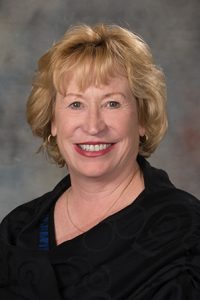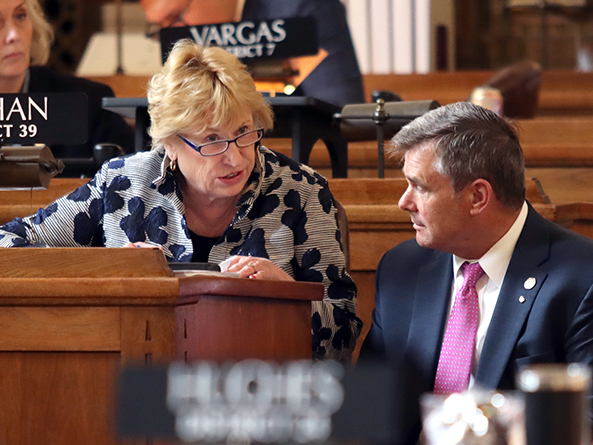Revenue omnibus bill that includes retail tax break advances
Lawmakers gave first-round approval May 16 to a bill amended to include more than two dozen revenue-related measures, including one intended to attract new-to-Nebraska retail businesses.

Under LB727, as introduced by Sen. Lou Ann Linehan of Elkhorn, purchases made by a nonprofit corporation that is a party to a financial agreement with a governmental unit would qualify for a current sales and use tax exemption if the governmental unit’s expenditure toward the project has been approved by its voters.
Under a Revenue Committee amendment, adopted 37-0, a nonprofit’s purchases would qualify for the exemption if the governmental unit’s expenditure toward the project is paid in whole or in part with redevelopment bonds.
The amendment also added provisions of 20 other bills that Linehan said are either noncontroversial “fixes” to existing tax-related measures or new proposals intended to grow Nebraska’s economy.
The amended provisions of LB74, also sponsored by Linehan, would allow construction contractors to be appointed as purchasing agents that could purchase materials tax free based on the buyer-based exemption of the contractor’s client.
Under the amended provisions of LB96, introduced by Dunbar Sen. Julie Slama, state sales and use tax could not be imposed on the gross receipts from the sale, lease or rental of baling wire and twine purchased for use in commercial agriculture.
The provisions of LB100, introduced by Sen. Steve Erdman of Bayard, would allow certain waste treatment and disposal facilities to qualify for tax incentives under the ImagiNE Nebraska Act.
Currently, livestock producers that invest at least $50,000 in a modernization or expansion project are eligible for a refundable state income tax credit under the Nebraska Advantage Rural Development Act.
The provisions of LB118, introduced by Plymouth Sen. Tom Brandt, would decrease the minimum required investment to $10,000 for applications filed on or after Jan. 1, 2024.
Brandt’s proposal also would set an application fee of $100 for an investment of less than $25,000 and $250 for an investment of at least $25,000 but less than $50,000. The current fee of $500 would apply to larger projects.
Under the provisions of LB165, sponsored by Sen. R. Brad von Gillern of Elkhorn, Nebraska educational savings plan trust accounts could be used for up to $10,000 in elementary or secondary school tuition per beneficiary per taxable year.
Under the amended provisions of LB180, sponsored by Brandt, retail dealers that sell and dispense biodiesel could apply for a refundable state income tax credit equal to 14 cents per gallon sold. The state Department of Revenue could approve up to $5 million in credits each year, and no new applications could be filed after Dec. 31, 2028.
Under the provisions of LB300, introduced by Linehan, state sales and use taxes could not be imposed on purchases by certain nonprofit organizations that provide community-based mental health or substance use services.
The provisions of LB344, introduced by Omaha Sen. Christy Armendariz, would exclude property taxes that, as of the time of payment, were delinquent for five years or more for purposes of tax credits provided under the Nebraska Property Tax Incentive Act.
The provisions of LB384, introduced by Sen. Eliot Bostar of Lincoln, would direct state sales and use taxes collected on the sale or lease of aircraft to the new Department of Transportation Aeronautics Capital Improvement Fund. The fund could be used to build, repair, renovate, rehabilitate, restore, modify or improve infrastructure at Nebraska’s public-use airports.
The provisions of LB407, introduced by Linehan, would extend the application deadline under the Nebraska Transformational Projects Act from Dec. 31, 2023, to Dec. 31, 2025.
Under the provisions of LB447, sponsored by Bostar, retired firefighters would qualify for a state income tax deduction on health insurance premiums they paid during the taxable year. Bostar’s proposal also would make firefighters, their legal dependents and the legal dependents of law enforcement officers eligible for a tuition waiver.
The provisions of LB491, introduced by von Gillern, would reinstate the Nebraska Advantage Research and Development Act, which ended in 2022. Under von Gillern’s proposal, businesses could claim credits under the act until Dec. 31, 2033.
Under the provisions of LB495, introduced by Albion Sen. Tom Briese, Nebraska educational savings plan trust account distributions would not be subject to penalty if they constitute a rollover to a Roth individual retirement account.
Currently, agricultural and horticultural land that has an actual value reflecting purposes or uses other than agriculture or horticulture can qualify for special valuation if located outside the boundaries of a sanitary and improvement district, city or village.
The amended provisions of LB580, sponsored by Sen. Rick Holdcroft of Bellevue, would strike that requirement and instead require that the land consist of five acres or more. He said the change would allow certain property annexed by Gretna that currently is used for agriculture to retain its special valuation until commercial development begins.
The amended provisions of LB584, introduced by Seward Sen. Jana Hughes, would impose a tax on the selling or dealing of electronic nicotine delivery systems.
For systems containing 3 milliliters or less of consumable material, the tax would be 5 cents per milliliter. For systems containing more than 3 milliliters, the tax would be 10 percent of the purchase price paid by the first owner or the price at which the first owner who made, manufactured or fabricated the system sells the item to others.
Under the amended provisions of LB692, sponsored by Linehan, the state Department of Economic Development could approve applications to create “good life districts.”
Proposed projects within a district would have to meet certain thresholds related to development costs and job creation. For a project located in a county with 100,000 or more inhabitants, an applicant also would have to demonstrate that, upon completion of the project, at least 20 percent of the project’s sales would be made to out-of-state residents and that the project would attract new-to-market retail businesses and draw at least 3 million visitors per year.
Transactions occurring within a district would be subject to a reduced state sales tax rate of 2.75 percent.
The amended provisions of LB697, introduced by Sen. Danielle Conrad of Lincoln, would make several changes to the Nebraska Job Creation and Mainstreet Revitalization Act and extend its sunset date from Dec. 31, 2022, to Dec. 31, 2030.
The act provides for a nonrefundable state income tax credit equal to 20 percent of eligible expenditures up to a maximum credit of $1 million.
Under Conrad’s proposal, the maximum credit allocated to any one project would be $2 million. For historically significant real property located in a county that includes a metropolitan or primary class city, the credit would be equal to 25 percent of eligible expenditures. It would be equal to 30 percent of eligible expenditures in any other county.
Beginning in 2024, $12 million in credits could be allocated under the program, $4 million of which would be reserved for applications seeking less than $100,000 in credits.
Under the provisions of LB704, introduced by Glenvil Sen. Dave Murman, the owner of an ABLE account or the representative of the account’s beneficiary could distribute the account balance to specified individuals if it is less than or equal to $5,000 on the date of the beneficiary’s death.
Under the amended provisions of LB706, introduced by Sen. Mike Moser of Columbus, the state highway commission could, upon recommendation of the state Department of Transportation, issue up to $450 million in bonds between 2023 and 2029 to accelerate completion of highway construction projects, including Nebraska’s expressway system, under the Build Nebraska Act.
The measure would extend the act’s sunset date to 2042 and require all bonds to be paid off by June of that year.
The amended provisions of LB732, sponsored by Bostar, would extend the application deadline for the Convention Center Facility Financing Assistance Act from 2012 to 2030. The act turns back a portion of state sales tax revenue collected by convention centers and associated hotels to cities to help finance the facilities.
Under the committee amendment, a portion of state sales tax revenue collected by nearby retailers also would be turned back.
Additional amendments
Linehan introduced an amendment that also would allow cities to use turnback funds to repair or replace eligible convention center facilities.
The amendment includes provisions of five other bills, including LB623, introduced by Omaha Sen. Mike McDonnell. Under his proposal, concert venues of a certain capacity would qualify for state assistance under the Sports Arena Facility Financing Assistance Act.
The provisions of LB4, introduced by Sen. Rita Sanders of Bellevue, would require veterans with a 100 percent service-connected permanent disability to apply for a homestead exemption every five years rather than annually.
Also included are provisions of LB529, introduced by Blair Sen. Ben Hansen, which would update a law requiring some political subdivisions to participate in a joint public hearing before increasing their property tax request by more than a certain amount.
Among other changes, the measure would require a hearing to be held prior to Sept. 24 rather than Sept. 29 and require at least one elected official from each participating political subdivision to attend.
Provisions of LB97, introduced by Sen. Robert Clements of Elmwood, would modify a reporting requirement related to inheritance taxes.
Under his proposal, each petitioner in a proceeding to determine inheritance tax would be required to submit a report to the county treasurer in the county where the determination was conducted. The report would include the amount of inheritance tax revenue generated and other information.
It also would require the state Department of Revenue to compile inheritance tax reports from counties and make them available to the public on its website.
Finally, Linehan’s amendment would add the amended provisions of LB577, introduced by Omaha Sen. John Cavanaugh, which he said would update Nebraska’s tax sale certificate process to help address “equity theft.”
The measure would allow someone who purchases a tax sale certificate to apply to a county for a tax deed if the difference between 110 percent of the property’s assessed value and the amount needed to redeem the property is $25,000 or less. If the difference is greater, the purchaser would have to foreclose the lien represented by the certificate in district court.
Within 30 days of the county’s granting of a deed, the grantee would have to pay any surplus — calculated using either the property’s sale price or its assessed value — to the property’s previous owner.
Sen. Carol Blood of Bellevue introduced an amendment that would exempt breast pumps and certain nursing supplies from state sales and use tax. It failed on a vote of 14-25. Twenty-five votes were needed.
After adopting Linehan’s amendment on a vote of 40-0, senators voted 44-0 to advance LB727 to select file.


